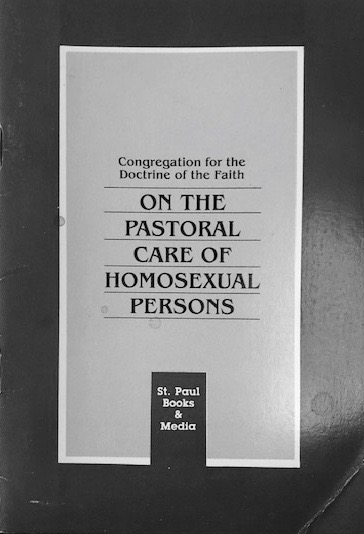
David Carlin is a retired professor of sociology and philosophy at the Community College of Rhode Island, and the author of The Decline and Fall of the Catholic Church in America and, most recently, Three Sexual Revolutions: Catholic, Protestant, Atheist.
Apart from the grace of God, our most urgent need at the moment is a papal encyclical on homosexuality. Failing that, the American Catholic bishops should issue a collective pastoral letter on homosexuality. And failing that, individual American bishops should issue diocesan pastoral letters on homosexuality.
Why do I say this need is “urgent”? Because a great campaign is underway in the United States, Canada, and Europe (especially Germany) to amend or nullify the perennial Catholic teaching on homosexual practice. If this campaign is not effectively resisted, the Catholic Church in the United States, like a number of “mainline” Protestant churches, will commit something like institutional suicide.
Let me cite a few evidences of this campaign.
For one, there is the pro-LGBT book Building a Bridge(a bridge between the Catholic Church and the “LGBT community”), written by the well-known Jesuit writer, Fr. James Martin. This book has been endorsed by Cardinal Kevin Farrell (prefect of the Vatican’s Dicastery on Laity, Family, and Life!), Cardinal Joseph Tobin of Newark, and Bishop Robert McElroy of San Diego.
Second, there is the apparent fact that the typical student in a Catholic college approves of same-sex marriage and thinks that you’re a narrow-minded bigot if you don’t approve of it too.
Third, there is general silence from the pulpit on this topic. It is a rare priest who tells his parishioners at a weekend Mass that homosexual sodomy is, from a Catholic point of view, an atrocious sin.
Fourth, there is the widespread practice of homosexuality among priests and seminarians. Nobody is quite sure of the numbers, but everybody seems to agree that the percentage of priests who are (or who were in their younger days) active homosexuals are far higher that the percentage of active homosexuals in the general population.
Fifth, there is the notable tendency among Catholics, including Catholic priests and bishops, to condemn the sexual molestation of minors without at the same time condemning the priestly homosexuality that has been, in at least 80 percent of the cases, a pre-condition for this molestation; a sine qua non(to borrow a phrase from what used to be the quasi-sacred language of the Church).
This tendency to condemn sexual abuse while avoiding condemnation of homosexuality was on display in Rome a few weeks ago at the synod of bishops.

This encyclical or these pastoral letters I’m talking about – what would they say?
Above all, they would reiterate the ancient Catholic teaching on this topic, a teaching rooted in Genesis and the Law of Moses. The letter would note that the Old Testament allows exceptions for incest (after all, who did the children of Adam and Eve marry?), and it allows exceptions for polygamy (both of them horrible sins), but it makes absolutely no exception for homosexual sodomy.
That condemnation continues in the letters of St. Paul (most notably in the “homophobic” first chapter of his Epistle to the Romans); and is found by very clear implication in the words of Jesus himself when he referred (a) to the sins of Sodom and Gomorrah and (b) to the passage in the book of Genesis that says, “male and female he [God] made them.”
The letter would acknowledge that it goes without saying that our duty of Christian love of neighbor means that we should love our homosexual neighbors, but the letter would point out that this duty of love does not mean that we should approve the sins of our homosexual neighbors – which is precisely what the LGBT movement demands of Christians.
Likewise, we must also love those of our neighbors who are thieves, liars, wife-beaters, adulterers, fornicators, and members of the Mafia. But we must do this without giving our stamp of approval to their wrongdoing.
The letter would also take note of the fact that it is hard nowadays, very hard indeed, for Catholics to disapprove of homosexuality since this will lead many of our relatives, friends, neighbors, co-workers, and tennis partners to think of us as narrow-minded and hard-hearted.
Worse still, our disapproval will cause pain to friends who are themselves homosexuals or are the parents of homosexual children; they will feel that you are expressing something like hatred for them or their children.
The letter will have to say: As a Catholic, you have to choose between fidelity to your faith or the approval of your friends, neighbor, etc. If you choose the former, you may lose old friends. In other words, you may have to undergo a mini-martyrdom. But that’s the religion you belong to. If you don’t like it, maybe you should join a liberal Protestant church, e.g., the Episcopal Church of the United Church of Christ.
And then, of course, there is a growing movement – at the national and international levels – to criminalize all such expressions of the ancient Christian morals as “hate speech,” which may be banned from public spaces including the Internet, or “hate crimes” punishable in civil law. all
If you are a true Christian you are, of course, quite willing to be thrown to the lions for your faith. But if you’re not unwilling to face the lions, why should you fear the disapproval of your friends and neighbors?
Many Catholics of course feel that it is “unreasonable” that our religion expects us to disagree with friends, neighbors, government, and what passes for moral thought. But an encyclical on homosexuality would have to explain why – to quote an authoritative source – that is thinking like men, not God.